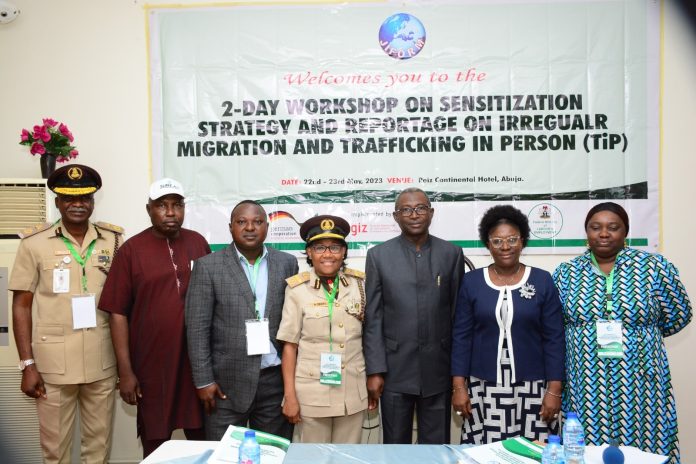By Ere-ebi Agedah
Participants at the just concluded 2-day workshop for journalists on sensitization strategies and reportage on irregular migration and human trafficking organized by the Journalists International Forum For Migration, JIFORM have observed that the media plays a vital role in discouraging irregular migration, stressing that journalists must begin to emphasize on its perils through their reportage.
This recommendations was part of the communique issued at the end of the workshop on Tuesday in Abuja, supported by the Nigeria-German Centre for Jobs, Migration and Reintegration (NGC) and the Migrants Resource Centre (MRC) of the Federal Ministry of Labour and Employment.
Speaking at the opening ceremony of the workshop, Comptroller-General of the Nigerian Immigration Services (NIS) Isah Idris Jere who was represented by Assistant Comptroller General Ngozi Odikpo charged the media practitioners to keep the public informed on the ills of irregular migration.
The NIS boss encouraged JIFORM as a stakeholder to continue to work with local and international organizations whose primary mandates were to promote safe and regular migration.
These, he said, include International Organization for Migration, FIIAPP, United Nations Office on Drugs and Crime and International Center for Migration Policy Development
In the same vein, Former Comptroller General of Nigeria Immigration Service, Muhammed Babandede, said it was pertinent that the media educates the populace about the dangers of irregular migration and trafficking in persons.
According to the former Immigration chief, migration itself is not a crime but actually contributes to reviving nation’s economy.
According to Babandede, migration must be done through the legal means, which includes obtaining all necessary and relevant documents before embarking on such a trip.
“We need to stop irregular migration and trafficking in persons by reporting the good side of Nigeria instead of focusing on the negative aspects.
“Ignorance is a very key factor when it comes to trafficking in persons and the media is that critical driver in fighting trafficking in persons.
“I expect professional reporting after this workshop. Don’t show the people that Europe is paradise, we must promote heroism”, he stated.
Simultaneously, Tolulope Olaiya, who represented the Team Leader of the NGC, a programme under the German Corporation for International Development, Ms Sandra Vermuijten, which implements the Returning to New Opportunities Programme of the German Federal Ministry of Economic Cooperation and Development, said the agency would continue to support the JIFORM capacity building initiative for journalists.
Olaiya, who is the Abuja Coordinator of the NGC, said, “Words carry more significance beyond the pages they are printed on; they could have devastating effects on victims of human trafficking, for example, they could also open the public’s eyes to false hopes that are peddled by bad actors.
“Between December 2017 to December 2022, the BMZ programme has provided over 282, 000 individual support measures to returnees and the local population, provided almost 60,000 individual consultations, placed over 30,000 persons on employment, provided over 42,000 business start-up measures, over 133,000 qualification measures and provided over 1600 psychosocial support services”, she said.
JIFORM President, Dr. Ajibola Abayomi, noted that the workshop was designed as another opportunity particularly for journalists as well as other stakeholders to appraise the role of the media in the reportage of migration concepts with an insight into the investigative and reporting strategies aimed at reducing human trafficking and irregular migration.
Dr Ajibola added that journalists must endeavour to track illicit funds kept by persons involved in human trafficking, while placing premium value on facts.
In his presentation on media reportage and management of migration in Nigeria, Dr. Ajibola emphasised on the importance of training and evidence-based reporting.
The two-day training involved several technical sessions which featured question and answers sessions.
The workshop came up with high-impact actions that would help to maximize the enormous impact of the media in the drive against irregular migration.
Speakers at the workshop were Dr Ajibola Abayomi, President of JIFORM; Comptroller NIS Rivers State, James Sunday, Vincent Adekoye, National Press Officer, National Agency for Prohibition of Trafficking In Persons (NAPTIP), and Mrs Ovie Maureen, the Head of Migrant Resource Centres, Federal Ministry of Labour and Employment.
On day two of the training, Sunday James, the Comptroller of Immigration in Rivers State and former national spokesman of the NIS made a presentation on visa issuance and the pathway to successful, safe, and regular migration.
The National Press Officer of the National Agency for the Prohibition of Trafficking in Persons, NAPTIP, Vincent Adekoya, urged journalists to observe the ethics of their profession, national interest and the protection of the dignity and privacy of victims of irregular migration and trafficking in persons in their reportage.
Speaking on the Topic, ‘‘Survivor Centered Report Of Tip And Irregular Migration And Humanity”, Mr Adekoya provided an opportunity for the participants to appreciate their roles better as journalists, give attention to those ethical issues, and report issues of human trafficking and irregular migration effectively from the point of knowledge with a heart for survivors.
At the end of the workshop, it was agreed among others that NAPTIP establishes a specialized unit with uniforms to enhance their effectiveness in addressing the risks associated with their task.
Also, there was a consensus that the media has enormous potential tools for advocacy due to its attribute as a potent outlet for influencing public opinion and effective communication to a larger audience.
Journalists were tasked to accurately determine and define the national borderline in their reports, play a role in exposing those involved in trafficking persons in order to reduce incidents of human trafficking.







